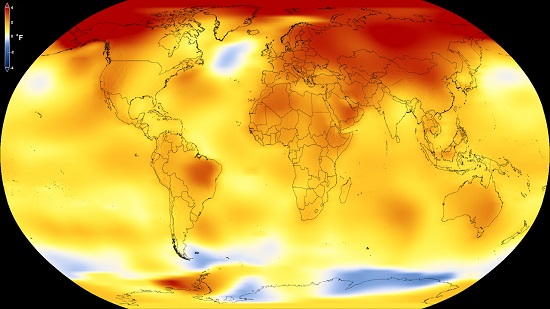
Story of the Week... Climate Feedback's Review of 25 Articles... Toon of the Week... Graphic of the Week... SkS Spotlights... Video of the Week... Reports of Note... Coming Soon on SkS... Poster of the Week... Climate Feedback Reviews... SkS Week in Review... 97 Hours of Consensus...

Earth’s global surface temperatures in 2017 ranked as the second warmest since 1880, according to an analysis by NASA.
Continuing the planet's long-term warming trend, globally averaged temperatures in 2017 were 1.62 degrees Fahrenheit (0.90 degrees Celsius) warmer than the 1951 to 1980 mean, according to scientists at NASA’s Goddard Institute for Space Studies (GISS) in New York. That is second only to global temperatures in 2016.
In a separate, independent analysis, scientists at the National Oceanic and Atmospheric Administration (NOAA) concluded that 2017 was the third-warmest year in their record. The minor difference in rankings is due to the different methods used by the two agencies to analyze global temperatures, although over the long-term the agencies’ records remain in strong agreement. Both analyses show that the five warmest years on record all have taken place since 2010.
Because weather station locations and measurement practices change over time, there are uncertainties in the interpretation of specific year-to-year global mean temperature differences. Taking this into account, NASA estimates that 2017’s global mean change is accurate to within 0.1 degree Fahrenheit, with a 95 percent certainty level.
Long-term warming trend continued in 2017: NASA, NOAA, NASA's Goddard Institute for Space Studies, Jan 18, 2018
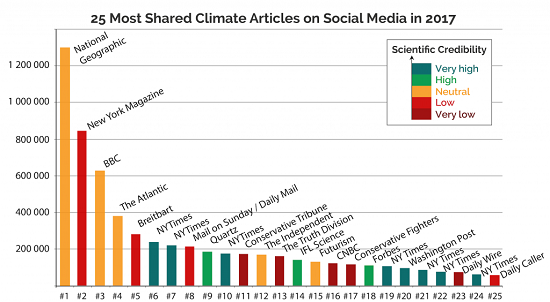
Summary
Many stories were written about climate science in 2017, but were the ones that “went viral” scientifically accurate? To find out, we compiled a list of articles with the most comments, shares, and likes on social networks using data from Buzzsumo*. From that list, we selected the articles containing verifiable assertions on the topic of climate science (we searched for articles containing “climate change” or “global warming”, leaving aside stories about politics, or stories about natural disasters with no substantial discussion of climate change).
We then asked scientists with relevant expertise to provide a brief assessment of their scientific credibility.
Here are the articles ranked by popularity (Click for details on the evaluations for each article):
Most popular climate change stories of 2017 reviewed by scientists, Climate Feedback Reviews, Jan 17, 2017
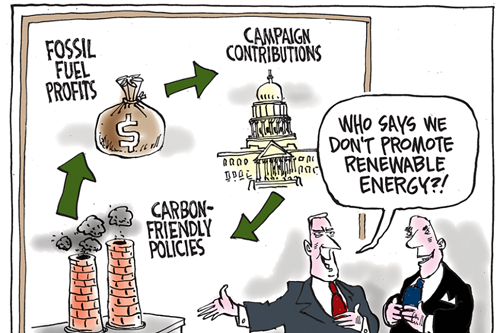
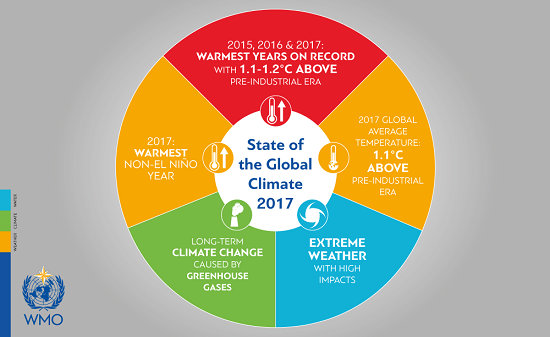

Established in 2007 and headquartered in London, UK, Climate Action works in a unique, contractual partnership with the United Nations Environment Programme (UNEP) – the world’s foremost body on environmental protection and stewardship.
Climate Action establishes and builds partnerships between business, government and public bodies to accelerate international sustainable development and advance the ‘green economy’.
We do this by providing a global media and events platform across which stakeholders can share knowledge, technologies and expertise, and identify innovative solutions to the challenges faced by climate change and a growing population.
For our partners and supporters we help engage the private sector, bringing innovations, technologies and finance to the debate.
For our clients we help generate profitable business opportunities and partnerships, provide top-level access to emerging markets and reinforce their commitment to, and their position as leaders within, the global sustainability industry.
Long-term warming trend continued in 2017: NASA, NOAA, NASA's Goddard Institute for Space Studies, Jan 18, 2018
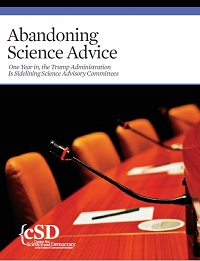
Analysis finds an unprecedented level of neglect, disrespect, and cancelled meetings for scientific advisory boards, with profound implications for our health and safety.
Abandoning Science Advice: One Year in, the Trump Administration Is Sidelining Science Advisory Committees (2018), Center for Science & Democracy/Union of Concerned Scientists, Jan 18, 2018
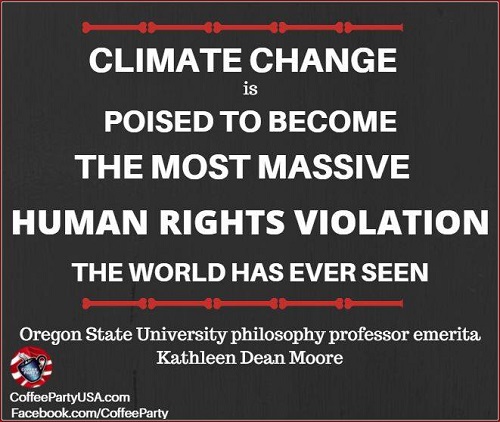
Futurism story on Great Barrier Reef compromised by sensational headline
Analysis of "Scientists Announce That The Great Barrier Reef is Officially “Terminal”"
Published in Futurism, by Jolene Creighton, June Javelosa on 12 Apr. 2017
Three scientists analyzed the article and estimate its overall scientific credibility to be 'neutral' to 'low'.
A majority of reviewers tagged the article as: Misleading.
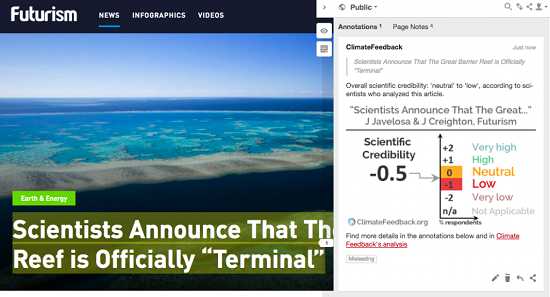
SUMMARY
This April 2017 story at Futurism describes a statement released by James Cook University’s ARC Centre of Excellence for Coral Reef Studies on bleaching along Australia’s Great Barrier Reef. Bleaching occurs when corals are exposed to excessively warm water.
Scientists who reviewed the article found that most of the information is accurate (except for a couple generalizations), but the headline is not supported by the story. The headline seems to indicate that scientists were quoted as saying the the Great Barrier Reef “is ‘terminal’”, but no source used that word.
See all the scientists’ annotations in context
This is part of a series of reviews of 2017’s most popular climate stories on social media.
Futurism story on Great Barrier Reef compromised by sensational headline, Climate feedback, Jan 16, 2018
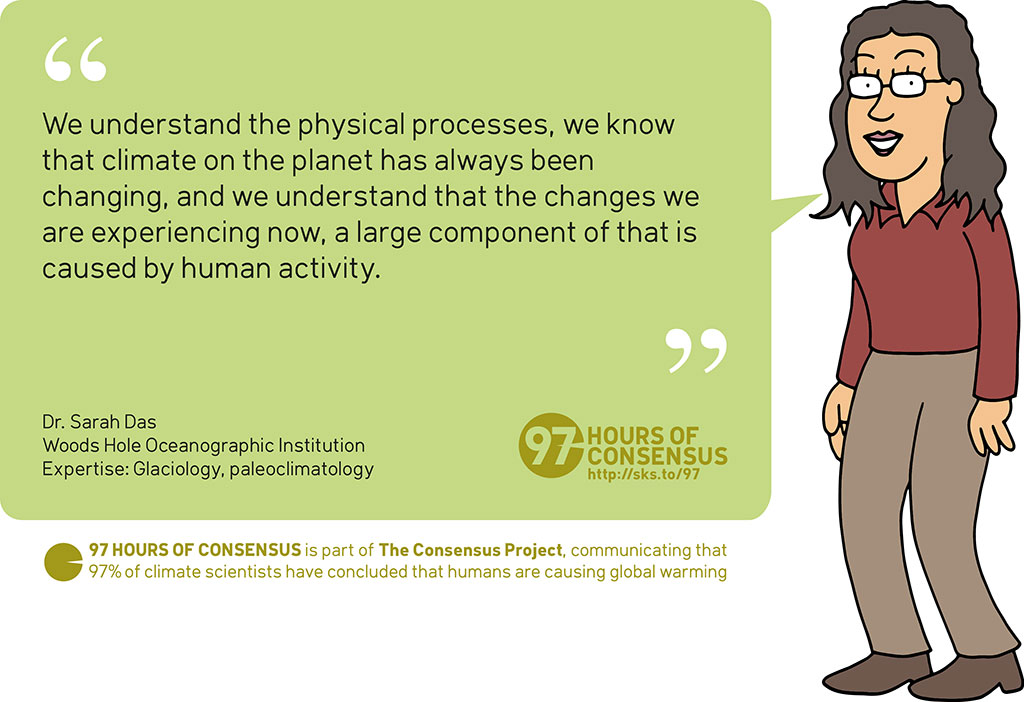
Sarah Das' bio page and Quote source
High resolution JPEG (1024 pixels wide)
Posted by John Hartz on Sunday, 21 January, 2018
 |
The Skeptical Science website by Skeptical Science is licensed under a Creative Commons Attribution 3.0 Unported License. |